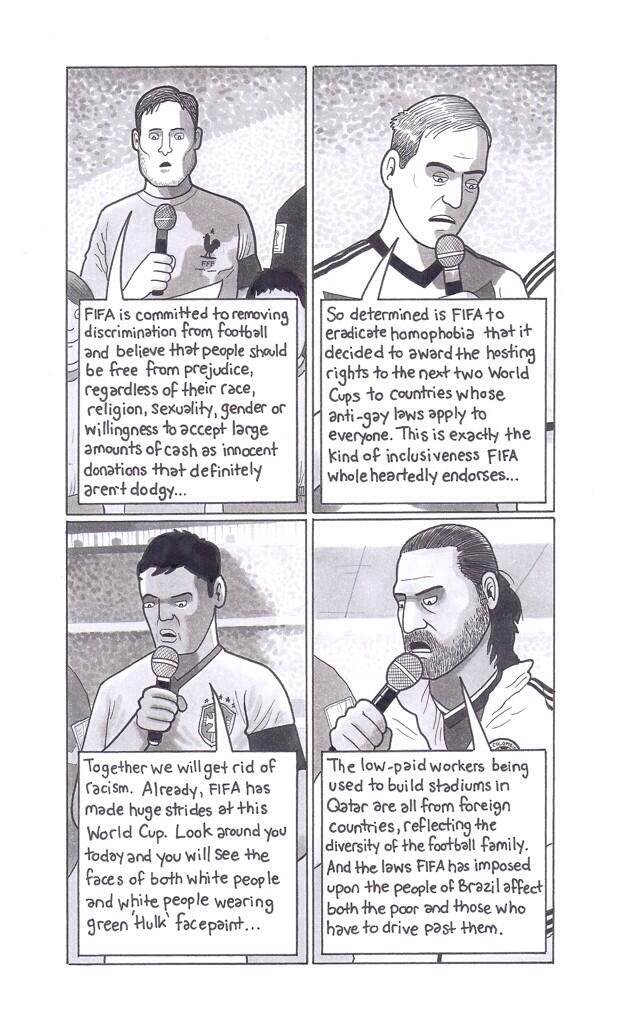I chatted about the 2014 World Cup with Assumpta Oturu on KPFK Pacifica Radio‘s Spotlight Africa program.
We analyzed Brazil’s historic collapse, Germany’s youth development policies, club versus country loyalties, African teams’ performances and what can be done to improve their results in global football.
Listen to the entire July 19, 2014, show here.
Tag: 2014 World Cup
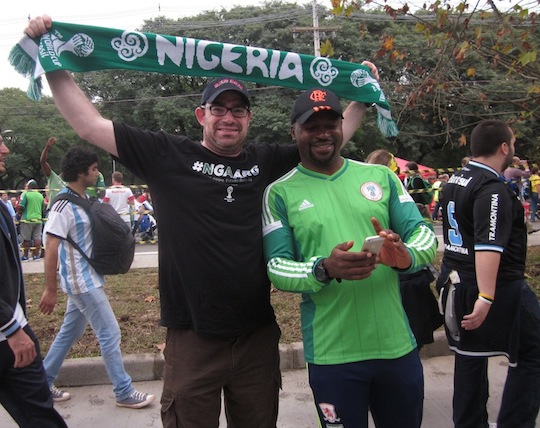
Guest Post by *Derek Charles Catsam
I recently returned from the 2014 World Cup in Brazil. It was a remarkable experience in a beautiful country. Everywhere we went people were gracious, joyful hosts. We ate fantastic churrasqueira (the Brazilian barbecue that will fuel my dreams for months) and drank among friends. The games were tremendous, the colorful visiting fans (with special mention to the dancing, chanting, singing, drinking Argentine throngs) made the World Cup the event that it is. The protests were more intermittent than expected. But the issues raised were as valid as ever.
I was based in Porto Alegre in the state of Rio Grande do Sul on Brazil’s southern border with Uruguay and Argentina. I attended four matches in Estadio Beria-Rio, the home of Sports Club Internacional: France-Honduras, Algeria-South Korea, Argentina-Nigeria, and the round of 16 match pitting eventual champions Germany against the Algeria. With 32 teams competing, the first two weeks of the World Cup are an unparalleled Carnival of Nations. Porto Alegre was in the midst of a Brazilian winter, hardly freezing, but occasionally raw and damp. The bikinis and swimming shorts that many of you saw as the regular going-to-commercial interludes on ESPN were many hundreds of miles north.
The tournament, which equaled the most goals (171) ever scored in a World Cup, was spectacularly entertaining and Germany is certainly a worthy champion. But once the confetti cleared, the last drinks were downed, tourists returned home, and Brazilians shook off the shameful way the Seleção flamed out of the tournament (and I do not for one second believe that the presence of Thiago Silva and Neymar against Germany and the Netherlands would have made much difference—Brazil’s problems were systemic) a familiar question looms: Was hosting the World Cup worth it?
Struggling Italy Robbed at the World Cup
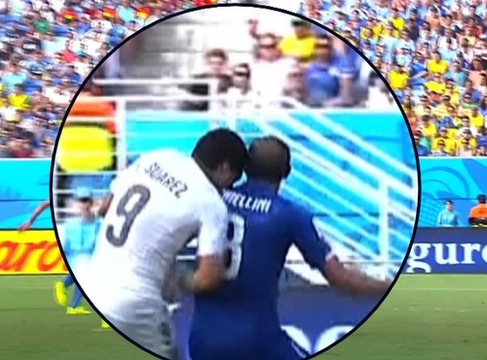
36 hours have passed since millions of Italians watched the national team get eliminated from the World Cup after a 1-0 loss to Uruguay.
Here in Italy, the media and the pundit class have joined ordinary fans in criticizing the team. First in the line of fire is Cesare Prandelli, the coach, rightly taken to task for dubious roster selection, poor match management, improvised tactical changes, and an inability to bind together a group of “senators” (i.e. veterans) and relatively inexperienced youngsters. His resignation in the aftermath of the Uruguay loss, came not a moment too soon for many Italians.
Balotelli, the only player in the squad with potential to be a game-changer, has also come in for plenty of criticism. Reading the papers, watching endless debates on TV, and talking with fans, it appears that many Italians, including vocal defenders of Super Mario, are disappointed with the star striker’s weak performance. Sadly, some racist Italians have taken to the web and social media to insult Balotelli for his blackness.
But I wouldn’t go so far as saying that Balotelli is being blamed for the World Cup debacle. Honest observers recognize that the failure of Italy’s 2014 World Cup campaign has multiple causes, not least the pathetic 0-1 loss to Costa Rica last week. As historian John Foot explained in an excellent column, there is a structural rot in Italian football that needs to be addressed. From corruption and mismanagement to suffering youth systems, club rivalries, and outdated stadiums; the list of major problems is quite long and vexing.
While this analysis is legitimate, there seems to be a consensus among Italians (and not a few neutrals) that the loss to Uruguay was an outright robbery perpetrated against an ordinary team.
The first half of Tuesday’s match was played evenly, with Italy rarely in trouble. Pirlo had a dangerous free kick saved by Muslera and Verratti distinguished himself as the best player on the pitch, weaving in and out of Uruguay’s workman-like midfield with creativity and dynamism. With a draw enough to see the Azzurri through to the next round, Italy was in control.
Then, a few minutes into the second half, the Mexican referee, Rodriguez Moreno, decided the match. In an inexplicably absurd decision, he sent off Marchisio with a straight red card for a normal tackle that showed no malice and, at best, deserved a yellow. What made this refereeing decision so outrageous is that previous Uruguayan fouls of a similar ilk had not been punished with any cards.
Moreno’s call transformed the match. With nearly the entire second half still to play in the heat of Natal, the Azzurri were a man down, less able to deal with fatigue, and psychologically shaken. Uruguay, on the other hand, seized on the opportunity and began dominating the match. Even so, only two goal-scoring chances came out of this advantage.
Perhaps dissatisfied with the outcome of his earlier outrage, Moreno then took center stage again. Suarez, the recidivist, sunk his fangs into Chiellini’s shoulder and then fell to the ground, theatrically, as if felled by a sniper’s bullet. The referee awarded a free kick to Italy, but did not send Suarez off despite Chiellini showing Suarez’s dental mold chiseled into his shoulder area. Surprisingly, the assistant referee provided no assistance.
Two things happened at this point. Instead of playing the final 12 minutes or so 10 vs 10, the Azzurri had to labor on a man down with players cramping and visibly tiring. Then, 100 seconds after the Suarez bite, the Italians lost their concentration defending the corner kick that produced Godin’s winning goal.
Most Italians recognize the 2014 national team was an ordinary one. Fans and pundits admit that Balotelli, Immobile, Cassano, Thiago Motta, De Sciglio and others put in sub-par performances. But people also know a robbery when they see one. And the culprit was Rodriguez Moreno. Curiously, another referee named Moreno (from Ecuador) also sent the Italians home from the 2002 World Cup. He is currently serving a long prison sentence in the United States for smuggling drugs.
Brazil 2014: World Cup Politics
The day before the magic kingdom opens in São Paulo, WKAR’s “Current State” host Mark Bashore interviewed me about the politics of the World Cup. We discussed FIFA profits and institutional reform, special World Cup laws and extraterritoriality, nation-building, development, civic protests, and what the future holds for Brazil, on and off the pitch. Originally broadcast live on June 11, 2014. Take a listen!
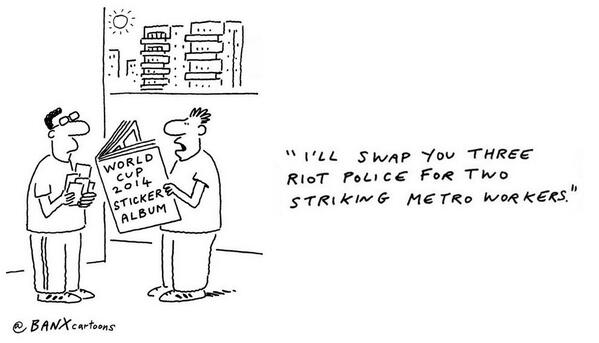
World Cup Music: “Afri Can”
An antidote to Shakira and Pitbull!
“Afri Can” is a charity single by Replay GH, a Ghana-based group featuring Zed Ay Kay (Replay GH), Fuji, Farid, and Gustav. It brings together influence from the five African countries that have qualified for the Brazil 2014 World Cup: Ghana, Nigeria, Cameroon, Algeria, and Ivory Coast.
According to the artists, “the different influences, and styles are seamlessly woven together to produce a modern Afro Beats song for the enjoyment of all football and music fans.” To find out more about Afri Can, visit: http://www.outofafricacampaign.com/afri-can/
Beyond Vuvuzelas and Samba
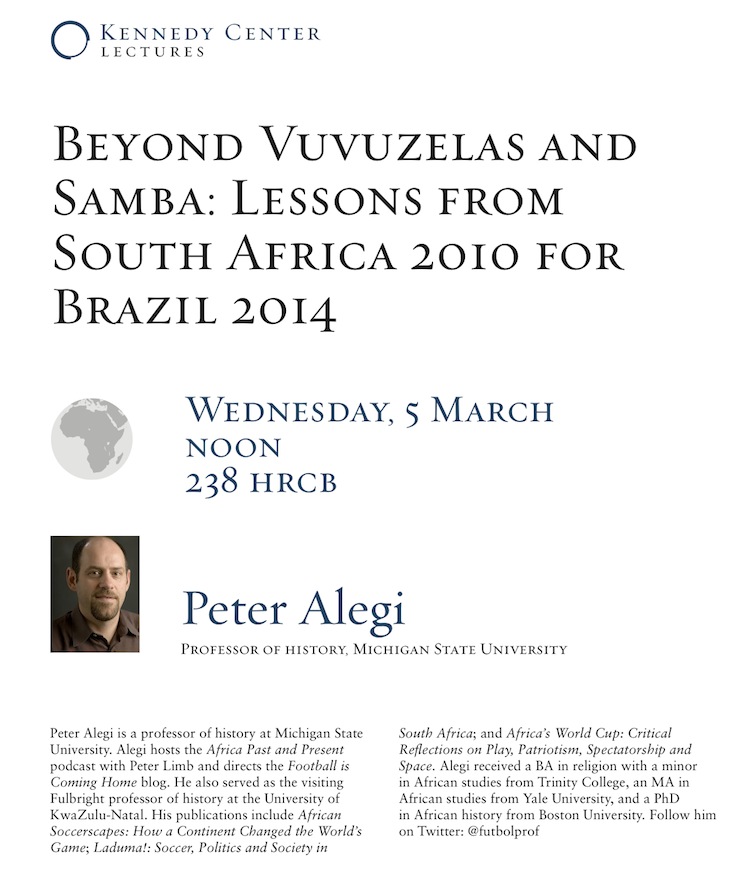 Listen to “Beyond Vuvuzelas and Samba: Lessons from South Africa 2010 for Brazil 2014,” a lecture I delivered at Brigham Young University’s David M. Kennedy Center for International Studies on March 5, 2014.
Listen to “Beyond Vuvuzelas and Samba: Lessons from South Africa 2010 for Brazil 2014,” a lecture I delivered at Brigham Young University’s David M. Kennedy Center for International Studies on March 5, 2014.
The talk analyzes the political, economic, and cultural dynamics of the 2010 FIFA World Cup in South Africa and its similarities to the upcoming 2014 FIFA World Cup in Brazil.
Click here to watch the video.
